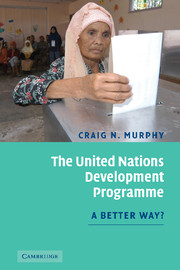Book contents
- Frontmatter
- Contents
- List of figures
- List of tables
- Foreword by Kemal Dervis
- Acknowledgements
- 1 Not the standard image
- 2 Development and the United Nations
- 3 Institutions for practical solidarity
- 4 Decolonization and economic transformation
- 5 Lewis in Ghana and after
- 6 Capacity, consensus, crisis, and consequences
- 7 Engaging liberation movements and revolutionary states
- 8 A learning organization: women, Latin America, and Africa
- 9 ‘Bottoms up’ development helps make UNDP a mammal
- 10 Working for ‘a holy man’ after the cold war
- 11 ‘Fabian socialists do not make the cut’
- 12 ‘Ploughing the sea’? UNDP and the future of global governance
- Index
2 - Development and the United Nations
Published online by Cambridge University Press: 08 January 2010
- Frontmatter
- Contents
- List of figures
- List of tables
- Foreword by Kemal Dervis
- Acknowledgements
- 1 Not the standard image
- 2 Development and the United Nations
- 3 Institutions for practical solidarity
- 4 Decolonization and economic transformation
- 5 Lewis in Ghana and after
- 6 Capacity, consensus, crisis, and consequences
- 7 Engaging liberation movements and revolutionary states
- 8 A learning organization: women, Latin America, and Africa
- 9 ‘Bottoms up’ development helps make UNDP a mammal
- 10 Working for ‘a holy man’ after the cold war
- 11 ‘Fabian socialists do not make the cut’
- 12 ‘Ploughing the sea’? UNDP and the future of global governance
- Index
Summary
UNDP's story begins in the first days of the United Nations, and not just the first days of the organization whose General Assembly convened in London on 10 January 1946, but at the outset of the anti-fascist alliance that took the same name four years earlier. To set the stage, we have to go back even further, to the Industrial Revolution, when the problem of ‘development’ arose, and then to the last days of the Great War, when the Allies made decisions that many would later believe encouraged fascism and led to the Second World War.
A problem of the industrial age
In 1986 I was reminded of the modernity of ‘development’, as we now understand it, while visiting Cape Verde to study responses to the devastating West African drought. The country's location, 500 km off the coast and in the path of the major Atlantic currents, helped it to become one of Europe's first colonies (the Portuguese arrived in 1456). It was also one of the last. When I visited, Cape Verdeans had just celebrated their ninth year of independence.
I began with a standard government tour for development professionals. My companions included an Italian from the United Nations Food and Agriculture Organization (FAO), an offcer from the Cuban mission, and a teacher from the United Kingdom. He was working on human rights issues, but also pursuing his hobby of visiting all the places sacked by the sixteenth-century British privateer, Sir Francis Drake.
- Type
- Chapter
- Information
- The United Nations Development ProgrammeA Better Way?, pp. 27 - 50Publisher: Cambridge University PressPrint publication year: 2006



